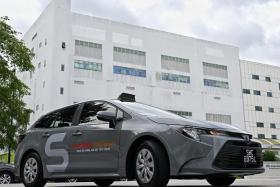Renewal of oldest MRT lines to cost more than $2.5 billion
Transport Minister says second phase of scheme to renew North-South and East-West lines is under way
A multi-year programme to renew the North-South and East-West MRT lines - Singapore's oldest and most heavily used - will cost more than $2.5 billion.
Revealing the figure during a visit to Bukit Batok MRT station on the North-South Line yesterday, Transport Minister Khaw Boon Wan said the second phase of the programme was under way.
This involves replacing the power supply system, track circuits and first-generation trains. In the first phase, the rail sleepers, third rail and signalling system of the two lines, which opened more than 30 years ago, were replaced.
CUT WAITING TIME
The renewal programme began in 2013 and is expected to be completed by 2024.
Mr Khaw said the power supply system renewal was "the most complex of the three remaining projects" and was about 40 per cent done.
The renewed system will allow the two lines to accommodate more trains and consequently reduce train waiting time.
Currently, 145 trains are deployed during the morning peak at intervals of 120 seconds.
When the renewal is completed, the intervals can be reduced to 100 seconds.
The power supply system renewal, to be done by 2023, entails replacing 1,300km of electrical cables, 206 transformers, 172 switchboards and equipment in 171 substations.
It also entails laying 250km of fibre-optic cables for real-time monitoring of the two rail lines.
The renewal of track circuits, which is part of the signalling system, is about 25 per cent done.
To speed up the renewal works, parts of the two lines have been subject to shorter operating hours on Fridays and weekends in recent years. This is expected to continue till the entire project is completed.
Meanwhile, 66 new trains are being built overseas by Bombardier and should start arriving next year. The Canadian group won the supply contract worth $1.2 billion, which includes service support for the 30-year lifespan of the trains.
Mr Khaw told transport workers present yesterday that 2019 was "a good year", with the network clocking more than a million train-kilometres between delays in the first nine months - an 18-fold improvement over 2011's figure, and one matched by few other metros in the world. But he cautioned against complacency.
"Today's success does not guarantee tomorrow's," said Mr Khaw.
The upgrading of the North-South and East-West lines aside, Mr Khaw said work to expand the rail network continues. He said government spending on new MRT lines "will peak during the next two decades".
Announced projects include the Thomson-East Coast Line (the first phase of which will open later this month), Jurong Region Line, Circle Line extension and the Cross Island Line.
When the Cross Island Line is completed by 2031, Singapore will have doubled its rail network to 360km.
Observers reckon there will be at least two other new lines beyond 2031. The Land Transport Master Plan 2040 states that a new line running parallel to the North-South Line is being studied.
Get The New Paper on your phone with the free TNP app. Download from the Apple App Store or Google Play Store now



